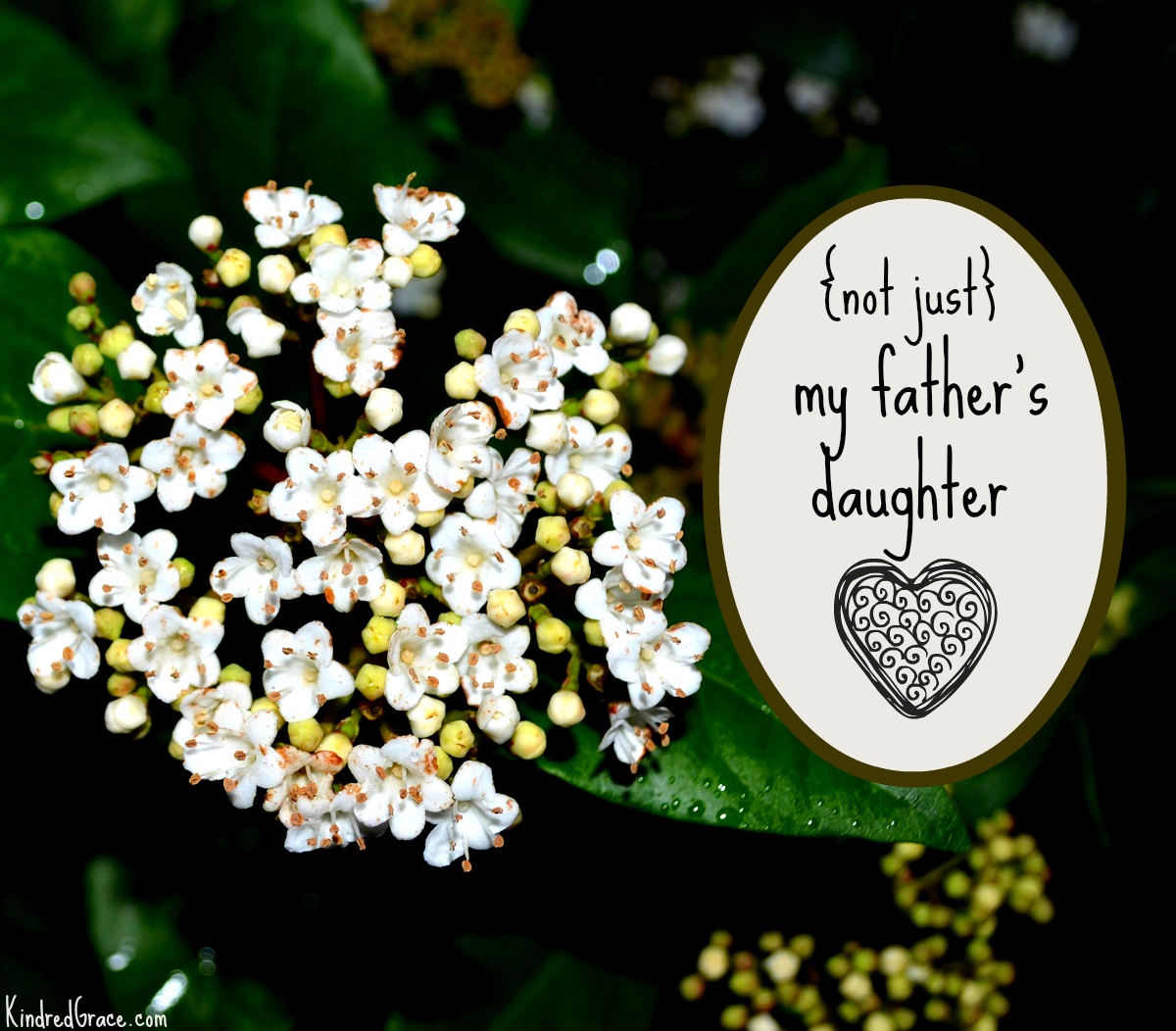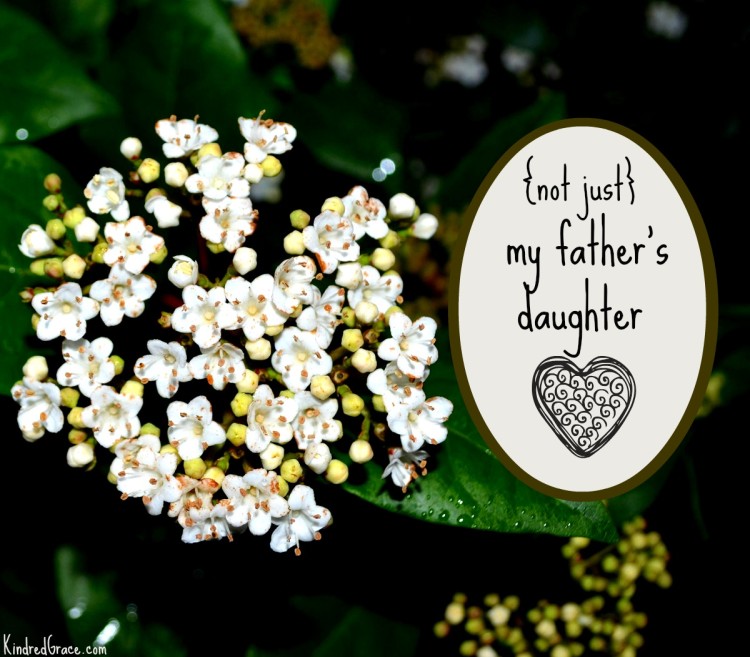{not just} my father’s daughter
I am and always will be my father’s daughter and I’m reminded of this fact whenever I look in the mirror and see the smile — shared by me and all my sisters — that I’ve inherited from my father and grandfather. Some things never change…
…and some things do and should change.
The challenge is knowing what should change and how to respond gracefully when it does (or doesn’t) change.
It’s a bountiful and wonderful blessing to be the child, the daughter in my case, of godly parents. The heritage of the godly is good!
And yet, for those of us who haven’t got married and left home as young as we anticipated, a long sojourn under our parents’ roof can sometimes lead to us feeling stuck in “childhood” and lost in the shadow of our parents’ personalities or overwhelmed by their faith and vocations. It can be confusing and frustrating to realise that we are five-and-twenty or older and known primarily as our fathers’ daughters — and presumed to think and feel as they do — when we not only have convictions and ideas of our own, but want to be known as Sarah or Jessica or Emily or whatever our name happens to be.
The danger with this situation is that we can adopt one of two (at least!) extreme positions. We can embrace the philosophy of the world and declare that “I have the right to be my own person” at any cost. Or we can embrace a supposedly Christian philosophy that, in an attempt to honour our fathers, encourages us to stunt our own growth and maturity by remaining as “children” in our parents’ homes. Finding a balanced, healthy and safe path between these extremes and honouring our fathers while flourishing as the adult, mature women we are created and called by God to be is hard.
I know that I don’t have all the answers, but I also believe that it’s possible to find a good path.
Most women in previous generations were identified as someone’s daughter or wife, sister or mother. In the Bible, however, we find stories of women who knew – and were known by – God personally.
God knew Eve, Rebecca, Huldah, Mary of Nazareth and Mary of Magdelene by name. Man is the head of women as Christ is the head of man (and the church) and men had a certain amount of spiritual care and responsibility for their womenfolk in the Torah as they do for their households in the Epistles. It’s not shameful or wrong to be known as our fathers’ daughters. Our identity, however, should be found in Christ (Philippians 3:7-11) rather than in any man – father, husband or otherwise.
Each of us, moreover, is intended to flourish as adult, mature women. It is to this that we are created and called by God. And desiring a level of independence and release is a natural part of flourishing in this way as we grow in years and mature in stature. Independence and release seem to happen most naturally when girls get married and leave home. The rest of us need to find a way to manage the change gracefully where we are today.
For you were called to freedom, brethren; only do not turn your freedom into an opportunity for the flesh, but through love serve one another. (Galatians 5:13)
1. Desire maturity rather than independence and release.
The Bible never tells women to be independent or seek release from parental love and interest, but it does tell all of us — men and women — to grow in maturity. We can all pray for greater maturity in our faith and our lives. We’re called to leave childish things behind as we mature. We’re called to flee youthful whims and pursue righteousness and godliness. We should be desiring to reach the measure of the stature of Christ (by His grace not our striving). We should be inclining towards the breadth, length, height and depth of the knowledge of the love and fullness of Christ. And, as we develop and grow spiritually, my experience is that God will provide guidance and opportunities and we’ll develop and grow emotionally, intellectually and socially.
2. Realise that maturity should, naturally and necessarily, produce a level of emotional, intellectual and social independence and release.
My experience is that this will happen sooner or later. And this can produce conflict between us and our fathers. It can be disorientating for our parents when their children change. Change is good — it’s natural and necessary — but it’s unsettling. We can try to see and understand our fathers’ perspective and their hearts of provision and protection. Be kind, be gentle, be patient (in other words, let the fruit of the Spirit in you rule your heart and your tongue). Be understanding. Don’t be personally critical and judgemental of your parents even if you think you’re right and they’re wrong. And seek to live in peace.
3. Communicate, communicate, communicate. And then communicate some more.
- You need to have a candid conversation with your parents about how you feel about being your father’s daughter and about wanting to mature and be known as you. When I discussed the fact that I was feeling lost in his shadow with my father, he was appalled that people were seeing me as “nothing more” than his daughter, which revealed to me that he wasn’t aware of the issue as well as reassuring me that it wasn’t his desire or doing. Take a deep breath and talk to your father honestly and lovingly.
- You need to let your father know that you love him and are committed to honouring him as his daughter. We want to look for ways to communicate that we may not be “papa’s baby girl” anymore, but we’re still our fathers’ daughters and we want to be their friends too. Speak life and love and lots of laughter — the kind you share together because you are and always will be father and daughter — into his life. Accept his love, even if it’s expressed in acts of service and you can do it or get it or drive there yourself thank-you-very-much. We need our fathers to know that we may want to move out of their shadows, but that we don’t want to lose them and the relationship — always changing, as all living and vital things are — that we share.
- You may also need to find a sweet, tactful way of reminding your father that you are your age and you think such-and-such is important. (Although this is not an excuse for an entitled, rebellious or rude attitude!) Your father, if he’s like my father, is more than happy for you to step out of his shadow, but he’s not always going to be comfortable and thrilled when he realises that his little girl has left his side. And he’s not always going to remember your desire or your motives. Think before you speak. And remember that a gentle and quiet spirit is a Christ-like strength, not a weakness. Don’t say anything that you’ll regret when you’re eighty.
Let the peace of Christ rule in your hearts, to which indeed you were called in one body; and be thankful. (Colossians 3:15)
Every daughter is her earthly father’s daughter. First and foremost, however, we’re all our Heavenly Father’s daughters. Our relationship with Him is our identity, our freedom and our security. Just remember to look in the mirror and see your eyes or your ears or the way your face lights up when you smile and catch a glimpse of your father or grandfather. Some things never change…
…and that’s right and proper.
read more >> living gracefully at home {after one-and-twenty} >> that it may be well with us {when we’re all grown up}



I agree; Maturity is the key. And communication is HUGE! Without communication, I would not have the awesome relationship with my parents that I do have. Showing grace and seeing things from my parents’ perspectives really helps too. I don’t want to ever lose my God-given precious relationship with them.
Excellent article! This is an issue that us definitely touchy. It is so much easier said than done too. Thanks for taking the time to write it!
great article, truth and writing…. My mission is for every son and daughter to have the Father the have always wanted…. blessings to you
Ed
Thank you for this!! I want to share it with all the young women I know who are jumping out of their parents’ homes in reckless abandon and not necessarily going about things in the right/Godly/graceful way. Maturity is sooo much more important than being independent or living outside my parents’ home. And NOTHING is worth losing that special relationship with my parents. Nothing 🙂
This was wonderfully written, Elisabeth! Thank you for this refreshing new perspective on this topic. It’s a touchy topic in Christendom these days. Your advice is all very challenging and great!
Oh, yes, it’s a touchy topic! Thank you for your kind words. I pray that MY words, in this article, are an encouragement! 🙂
Thanks for this, Elisabeth. I’ve been thinking through this exact issue lately, and your article was really clear and helped remind me of a few things! I really appreciate your words of wisdom here, so thank you. You know I’m a big fan of your writing anyway, but this was very timely and I am very grateful.
Elspeth
x
Thank you for your kind words, Elspeth, I’m delighted that this article is timely and I pray that, as you continue to consider these ideas, you’ll be blessed and encouraged! x